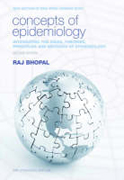
Concepts of epidemiology: integrating the ideas, theories, principles and methods of epidemiology
Bhopal, Raj
Epidemiology is the science that underpins health and health care, and is concerned with the pattern, frequency and causes of disease. This introductory text describes and illustrates epidemiology and its applications to policy making, health service planning, and health promotion. Raj Bhopal developed a conceptual approach to epidemiology in the first edition of this successful text, which involved a systematic focus on underlying concepts and fundamental principles, and this second edition expands upon this popular method. It emphasizes theories and principles, as the bedrock of methodology, countering the mounting criticism that epidemiology is an atheoretical discipline. The interdependence of epidemiological studies and their essential unit within a theoretical, technical and ethical framework is an important theme of this book. The emphasis is on interactive learning throughout, with each chapter including learning objectives, both theoretical and numerical exercises, recent examination questions from relevant courses, and a summary. The text is richly illustrated, with detailed material summarised in tables. The book is written in plain language, with all the necessary technical and specialised terminology explained and defined in a glossary. INDICE: Contents. 1. What is epidemiology? The nature and scope of a biological, social, and ecological science and of its variables. 2. The epidemiological concept of population. 3. Variation in disease by time, place, and person: a framework for analysis. 4. Error, bias, confounding and risk modification/interaction in epidemiology. 5. Cause and effect: the epidemiological approach. 6. Interrelated concepts in the epidemiology of disease: natural history, spectrum, iceberg, population patterns, and screening. 7. The concept of risk and fundamental measures of disease frequency: incidence and prevalence. 8. Presentation and interpretation of epidemiological data on risk. 9. Epidemiological study design and principles of data analysis: an integrated suite of methods. 10. Epidemiology in the future: theory, ethics, context, and critical appraisal
- ISBN: 978-0-19-954314-4
- Editorial: Oxford University
- Encuadernacion: Rústica
- Páginas: 417
- Fecha Publicación: 01/09/2008
- Nº Volúmenes: 1
- Idioma: Inglés
